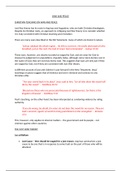WAR AND PEACE
CHRISTIAN TEACHING ON WAR AND PEACE
Just War theory has its roots in Aquinas and Augustine, who are both Christian theologians.
Despite its Christian roots, an approach to critiquing Just War theory is to consider whether
it is truly consistent with Christian teaching and revelation.
There are many wars described in the Old Testament, many of which are brutal in nature.
‘Joshua subdued the whole region… He left no survivors. He totally destroyed all who
breathed, just as the Lord, the God of Israel, had commanded’ – Joshua 10:40
These wars, however, are clearly recorded as waged by God, and are ways for God to
impose his judgement on populations. Arguably today, although some rulers declare war in
the name of God, they are not truly led by God. This suggests that wars are only just if they
are waged by God, not if they are consistent with Just War theory.
A different account of war and violence is put forward in the New Testament. Jesus’
teachings on peace suggest that all violence and war is immoral and contrary to any
Christian ethic.
‘”Put your sword back in its place” Jesus said to him, “for all who draw the sword will
die by the sword”’ – Matthew 26:52
‘Blessed are those who are persecuted because of righteousness, for theirs is the
kingdom of heaven’ – Matthew 5:10
Paul’s teaching, on the other hand, has been interpreted as condoning violence by ruling
authority.
‘If you do wrong, be afraid, for rulers do not bear the sword for no reason. They are
God’s servants, agents of wrath to bring punishment on the wrongdoer’ – Romans
13:4
This, however, only applies to internal matters – the government and its people – not
violence against other countries.
THE JUST WAR THEORY
Jus ad Bellum
1. Just Cause – War should be waged for a just reason. Aquinas summarises a just
cause to be one that is in response to some fault on the part of those who will be
attacked.




